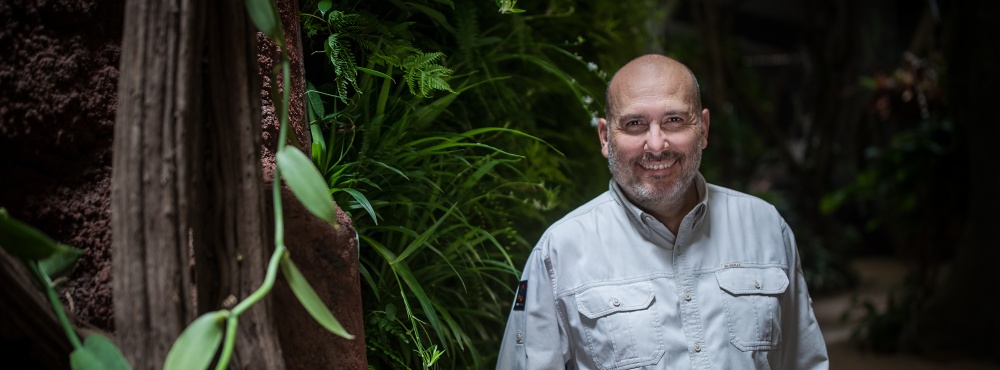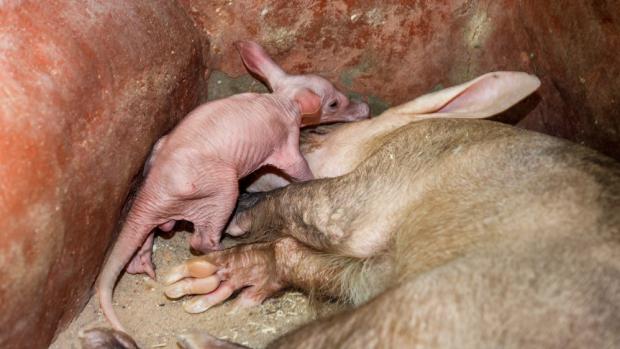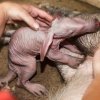The Baby from the African House

In my diary, I have a note from a Monday, July 13 meeting with our zookeepers. The note is about Kvída, our aardvark female, and it reads: “may give birth sooner”. We expected something like that based on her ultrasound exam results. But she managed to surprise us anyway and brought her baby into the world as early as early afternoon on Sunday, July 26. We had not expected it to come that soon.
 Our tiny aardvark on the fifth day of his life. His large ears droopy no longer, he is quite active at times. Photo by Miroslav Bobek, Prague Zoo
Our tiny aardvark on the fifth day of his life. His large ears droopy no longer, he is quite active at times. Photo by Miroslav Bobek, Prague Zoo
The news of this surprisingly early birth filled me with joy and apprehension at the same time. A baby aardvark is a fascinating creature. If you want something to compare it to, nothing in the real world will do: we would have to tap fairy tales or fantasy novels. And as for ten-year-old Kvída herself, she is one of my favorite animals. But here is the source of my apprehension: she lost her previous two babies on the fourth day after delivery. This has happened during the last two years. And even this little aardvark did not appear to be blessed with anything like “great expectations”. He weighed a mere 1,335 grams – 50 grams more than her last year’s baby – but that was still very little…
When I arrived at the Zoo later in the afternoon that Sunday, the little aardvark was already being tended to by Jindra Kotrbáčková and her colleagues. Even though the heat was turned way up in the African House exhibit, the baby’s temperature was still doing down, and, to add to our concerns, there was a risk that Kvída could roll over and crush him. With this in mind, Jindra placed him in a heated box and started carrying him to Kvída for regular suckling sessions. But as bad luck would have it, the little one stubbornly refused to suckle. On the other hand, he was very sprightly, and Kvída, on her part, showed a very keen interest in him. Things being as they were, the baby first received glucose and later also squirted-out foremilk with a breast-milk substitute.
When I look back at the little aardvark’s first week of life and the messages that I would receive several times a day from our team at the African House, it can all be summed up in the following sentence: “Kvída’s baby is not suckling, but is gaining weight thanks to infant formula.” Every time he gained a couple of dozen grams – which may sound like a trifling amount – we were very happy, and each such gain was a credit to the tireless efforts of Jindra and other keepers. Every two hours – except midnight to 6 am – they would bring the tiny aardvark to Kvída and spend 30 minutes to an hour trying to get him to nurse and letting Kvída look after him. Hidden from visitors’ eyes by a screen, they were lying in Kvída’s “lair” under the glowing heating unit. (A scandalized person wrote this to me on Facebook: “We looked into her little lair and saw – instead of Kvída – some person lying there, with sneakers on.” Well, that was our Jindra – and she was not slacking off there, trust me!) Only after all that would they take the baby back to the off-exhibit area to feed it with infant formula and keep it warm and comfortable.
Even though the little aardvark kept gaining weight (albeit with some breaks), I was worried sick that he would become passive and limp, something we witnessed with Kvída’s previous two offspring. Then last Monday, the ninth day of his life, I received this wonderful message from one of its keepers, Bára Dobiášová: “The little one has just drunk from his mother for the very first time!” On Tuesday, he nursed twice – just during the morning – and he now weighed half-a-kilogram more than at birth. Hooray!
Jindra Kotrbáčková and the other African House workers are still at it, still taking care of the tiny aardvark with unflagging dedication. He is nursing regularly now from his mother, but since Kvída does not always have enough milk, he is being given a breast-milk substitute as well. He is growing before their very eyes – clocking in at no less than 2,305 grams yesterday morning – and changing by the day. I do not want to speak too soon and jinx it, but let us hope that our visitors will – perhaps – be able to see him at the close of the summer holidays.
Miroslav Bobek, Director of Prague Zoo
ZOOPRAHA.CZ
Contacts
- The Prague zoological garden
U Trojskeho zamku 120/3
171 00 Praha 7
Phone.: (+420) 296 112 230 (public relations department)
e-mail: zoopraha@zoopraha.cz
Others










